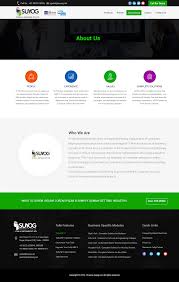Unlocking Success with Adobe Marketing Cloud: A Comprehensive Digital Marketing Solution
The Power of Adobe Marketing Cloud
Adobe Marketing Cloud is a comprehensive digital marketing platform that offers a wide range of tools and services to help businesses create, manage, and optimize their marketing strategies. With its suite of integrated solutions, Adobe Marketing Cloud empowers organizations to deliver personalized and engaging experiences to their customers across multiple channels.
Key Features of Adobe Marketing Cloud:
- Analytics: Gain insights into customer behavior and campaign performance with advanced analytics tools.
- Campaign Management: Plan, execute, and track marketing campaigns across various channels with ease.
- Personalization: Deliver targeted content and experiences based on customer preferences and behavior.
- Social Media Management: Monitor social media conversations, engage with customers, and measure social ROI.
- Mobile Marketing: Create mobile-optimized experiences and engage with customers on mobile devices.
- Email Marketing: Design and send personalized email campaigns to nurture leads and drive conversions.
The Benefits of Using Adobe Marketing Cloud:
By leveraging the capabilities of Adobe Marketing Cloud, businesses can:
- Improve customer engagement and loyalty through personalized experiences
- Increase conversion rates by delivering relevant content to the right audience at the right time
- Optimize marketing campaigns based on real-time data and insights
- Enhance brand visibility and reputation across digital channels
- Drive revenue growth through targeted marketing strategies
In today’s competitive digital landscape, having a robust marketing platform like Adobe Marketing Cloud is essential for businesses looking to stay ahead of the curve. With its powerful features and capabilities, Adobe Marketing Cloud enables organizations to create impactful marketing campaigns that drive results and foster long-term customer relationships.
Mastering Adobe Marketing Cloud: 7 Essential Tips for Effective Campaigns
- Utilize Adobe Marketing Cloud to create personalized and targeted marketing campaigns.
- Take advantage of the analytics tools in Adobe Marketing Cloud to track and measure the performance of your campaigns.
- Use Adobe Marketing Cloud’s automation features to streamline your marketing processes and improve efficiency.
- Integrate different components of Adobe Marketing Cloud for a comprehensive and cohesive marketing strategy.
- Stay updated on new features and updates released by Adobe to make the most of the Marketing Cloud platform.
- Collaborate with team members to leverage the collaborative capabilities of Adobe Marketing Cloud for better results.
- Invest time in training and learning about all the functionalities available in Adobe Marketing Cloud to maximize its potential.
Utilize Adobe Marketing Cloud to create personalized and targeted marketing campaigns.
By leveraging Adobe Marketing Cloud, businesses can harness the power of personalized and targeted marketing campaigns. This tip highlights the platform’s capability to tailor content and experiences based on customer preferences and behavior, ultimately enhancing engagement and driving conversions. Adobe Marketing Cloud empowers organizations to deliver relevant messages to the right audience at the right time, maximizing the effectiveness of their marketing efforts and fostering stronger connections with customers.
Take advantage of the analytics tools in Adobe Marketing Cloud to track and measure the performance of your campaigns.
Utilize the analytics tools available in Adobe Marketing Cloud to effectively monitor and evaluate the success of your marketing campaigns. By leveraging these tools, you can gain valuable insights into customer engagement, campaign effectiveness, and overall performance metrics. Tracking and measuring key performance indicators will enable you to make data-driven decisions, optimize your strategies, and enhance the impact of your marketing efforts.
Use Adobe Marketing Cloud’s automation features to streamline your marketing processes and improve efficiency.
Utilizing Adobe Marketing Cloud’s automation features can significantly enhance your marketing operations by streamlining processes and boosting efficiency. By automating repetitive tasks such as email campaigns, social media scheduling, and data analysis, businesses can save time and resources while ensuring consistent and timely delivery of marketing initiatives. This not only improves productivity but also allows teams to focus on more strategic activities, driving better results and overall effectiveness in reaching target audiences.
Integrate different components of Adobe Marketing Cloud for a comprehensive and cohesive marketing strategy.
To maximize the effectiveness of your marketing efforts, it is crucial to integrate different components of Adobe Marketing Cloud seamlessly. By combining analytics, campaign management, personalization, social media management, mobile marketing, and email marketing tools within the platform, businesses can create a unified and cohesive marketing strategy. This integration allows for a holistic view of customer interactions and enables targeted and personalized campaigns across various channels. By leveraging the full capabilities of Adobe Marketing Cloud in a harmonized manner, organizations can optimize their marketing initiatives for enhanced engagement and better results.
Stay updated on new features and updates released by Adobe to make the most of the Marketing Cloud platform.
To maximize the benefits of Adobe Marketing Cloud, it is crucial to stay informed about new features and updates regularly rolled out by Adobe. By staying updated on the latest enhancements, businesses can leverage the full potential of the Marketing Cloud platform, ensuring that they are equipped with the most advanced tools and capabilities to enhance their marketing strategies and deliver exceptional experiences to their customers across various digital channels.
Collaborate with team members to leverage the collaborative capabilities of Adobe Marketing Cloud for better results.
To maximize the potential of Adobe Marketing Cloud and achieve superior outcomes, it is crucial to collaborate effectively with team members. By harnessing the collaborative features of Adobe Marketing Cloud, teams can work together seamlessly, share insights, and leverage collective expertise to enhance marketing strategies and achieve better results. Effective collaboration not only fosters creativity and innovation but also ensures that all team members are aligned towards common goals, leading to more impactful and successful marketing initiatives.
Invest time in training and learning about all the functionalities available in Adobe Marketing Cloud to maximize its potential.
Investing time in training and learning about all the functionalities available in Adobe Marketing Cloud is crucial to maximizing its potential. By gaining a deep understanding of the platform’s features and capabilities, users can unlock its full power and leverage it effectively to drive successful marketing campaigns. Continuous learning and skill development ensure that businesses can make the most out of Adobe Marketing Cloud’s tools, leading to enhanced customer engagement, improved campaign performance, and ultimately, greater business success.












